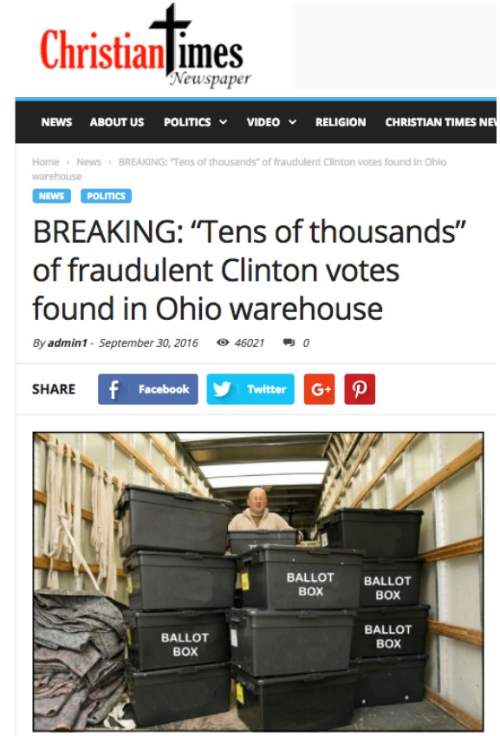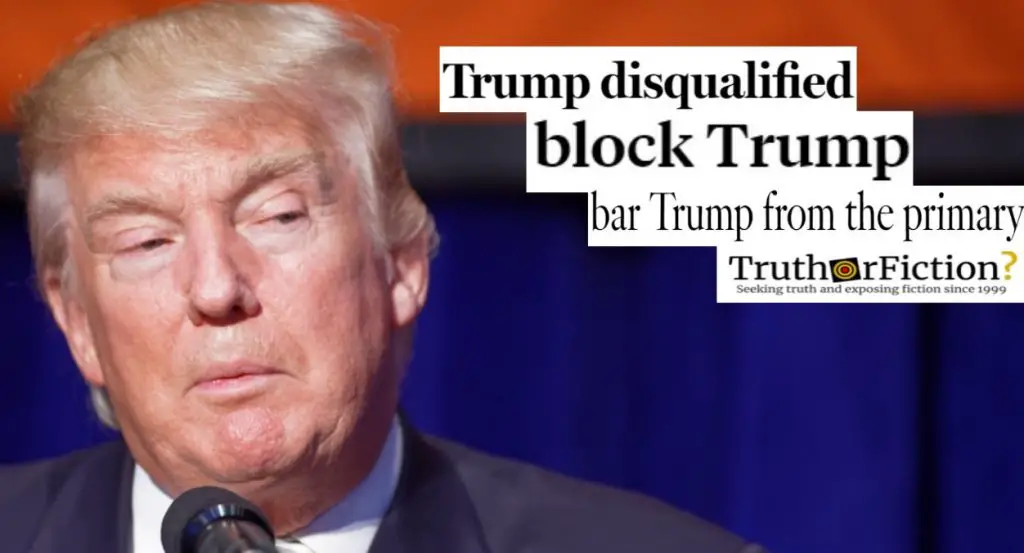The idea of taking Donald Trump off a presidential ballot, once a Maryland man’s disinformation-fueled cash-grab, became an actual possibility in some American states in 2023.
In December 2015, the website “christiantimesnewspaper.com” — seemingly named to fool readers into thinking it was the Christian Times, an actual news site — claimed that then-candidate Trump had been removed from the Republican Party primary ballot in five states:
Election judges in Iowa, New Hampshire, Nevada, North Carolina, and Florida all allegedly forwarded messages to the Trump campaign on Wednesday informing the Republican front-runner that his candidacy was invalid per state laws. If not resolved by February 1st, Trump’s campaign for the Republican nomination is effectively over.
Like many pieces of disinformation, the post included a kernel of truth — in this case, a report from WMUR-TV saying that a challenge to Trump’s eligibility in New Hampshire had been rejected by the state Ballot Law Commission.
A former GOP state party chair, Fergus Cullen, challenged Trump’s eligibility at the time, arguing that because he was registered in New York state as a Democrat, he should not be listed as a Republican candidate in New Hampshire. Cullen said he filed the challenge after Trump floated the idea of running as an independent should he fail to win the GOP primary. But Brian Cook, chair of the commission, dismissed Cullen’s argument as grandstanding.
“It was trying to make an editorial statement,” Cook said at the time. “The commission — regardless of what anybody thinks of the merits or demerits, or the philosophy or anything about a candidate — our sole role is to figure out if a filing was legal and accurate.”
The “christiantimesnewspaper” site, as well as its story, has since been deleted. In 2017 the New York Times revealed the identity of its creator: a self-described budding politcal consultant (and Trump voter) named Cameron Harris, who claimed that he bought the “christiantimesnewspaper.com” domain name for $5.
While the site was active, Harris would gain more attention for another fabricated story in 2016 bearing the headline “BREAKING: ‘Tens of thousands’ of fraudulent Clinton votes found in Ohio warehouse”:

“At first it kind of shocked me — the response I was getting,” Harris said of the story’s spread online. “How easily people would believe it. It was almost like a sociological experiment.”
The “experiment” proved to be lucrative for him:
Within a few days, the story, which had taken him 15 minutes to concoct, had earned him about $5,000. That was a sizable share of the $22,000 an accounting statement shows he made during the presidential campaign from ads for shoes, hair gel and web design that Google had placed on his site.
He had put in perhaps half an hour a week on the fake news site, he said, for a total of about 20 hours. He would come close to a far bigger payday, one that might have turned the $5 he had spent on the Christian Times domain into more than $100,000.
Trump would go on to be elected U.S. president in 2016 and lose his bid for re-election four years later — despite years of lies to the contrary and a violent coup attempt against the U.S. Capitol afterward. And because of that, the prospect of him being disqualified from running again has become legitimate.
As CBS News and other outlets have reported, Trump’s candidacy is facing actual legal challenges saying that he should be disqualified from running again based on Section 3 of the 14th Amendment, which reads:
No person shall be a Senator or Representative in Congress, or elector of President and Vice-President, or hold any office, civil or military, under the United States, or under any State, who, having previously taken an oath, as a member of Congress, or as an officer of the United States, or as a member of any State legislature, or as an executive or judicial officer of any State, to support the Constitution of the United States, shall have engaged in insurrection or rebellion against the same, or given aid or comfort to the enemies thereof. But Congress may by a vote of two-thirds of each House, remove such disability.
The separate lawsuits challenging Trump’s eligibility were filed in five states — California, Colorado, Florida, Michigan, and Minnesota — and argue that Trump’s purported incitement of the right-wing mob that attacked the Capitol in an effort to stop the certification of U.S. President Joe Biden constitutes a violation of that Amendment.
“While it is unprecedented to bring this type of case against a former president, January 6th was an unprecedented attack that is exactly the kind of event the framers of the 14th Amendment wanted to build protections in case of,” said Noah Bookbinder, president of the advocacy group Citizens for Ethics and Responsibility in Washington, whose group filed the lawsuit in Colorado. “You don’t break the glass unless there’s an emergency.”
Free Speech for People and Mi Familia Vota Education Fund, the two activist groups who filed the Minnesota lawsuit, also announced that they have contacted the secretary of state offices in California and Colorado, as well as seven other states — Georgia, Massachusetts, Michigan, New York, North Carolina, Oregon, and Pennsylvania — also calling on them to disqualify Trump.
“While the U.S. Justice Department, along with state and local authorities, must hold Donald Trump accountable for all crimes that he has committed, secretaries of state and chief election officials across the country must carry out their responsibility to follow the mandate of the Constitution and the Insurrectionist Disqualification Clause and bar Trump from any future ballot,” Free Speech For People President John Bonifaz said in a statement.
Even as he campaigned for re-election, Trump faced 91 felony charges in four separate criminal cases against him in separate states.
Update 9/17/2023, 9:04 p.m.: This article has been revamped and updated. You can review the original here. — ag
- Updated: Ballot Law Commission Throws out Challenge to Trump's Eligibility to Appear on GOP Primary Ballot
- From Headline to Photograph, a Fake News Masterpiece
- Lawsuit Filed to Remove Trump from Ballot in CO Under 14th Amendment
- The Constitution's Disqualification Clause and How It's Being Used to Try to Prevent Trump From Running for President
- Lawsuit Argues Trump Disqualified From Appearing on California Ballot
- Lawsuit Filed in Minnesota to Boot Trump From 2024 Ballot
- Florida Lawyer Files Challenge to Disqualify Trump from 2024 Race, Citing 14th Amendment
- Activist Files Legal Challenge to Disqualify Trump from 2024 Presidential Race in Michigan
- "Election Officials Must Carry Out Their Duty," Letters to Secretaries of State Make the Case for Why Trump is Constitutionally Barred from the Ballot

